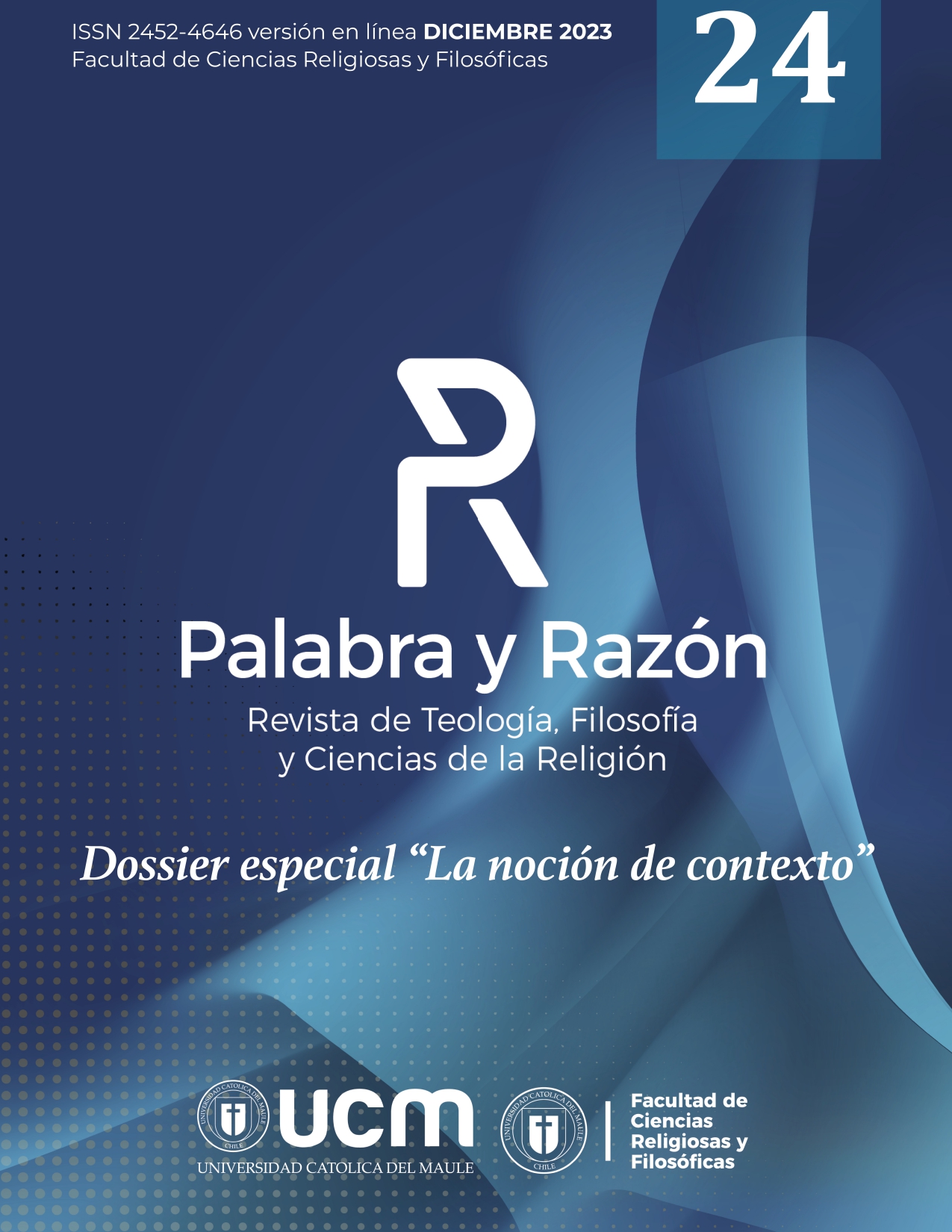Contexto e intención Un estudio interlingüístico de la noción de significado en árabe, español e inglés
Contenido principal del artículo
Resumen
Detalles del artículo
Arts, T., Belinkov, Y, Habash, N., Kilgarriff, A. y Suchomel, V. (2014). arTenTen: Arabic Corpus and Word Sketches. Journal of King Saud University - Computer and Information Sciences, 26(4), 357-371. https://doi.org/10.1016/j.jksuci.2014.06.009.
Avramides, A. (1989). Meaning and Mind: An examination of a Gricean account of language. The MIT Press.
Akman, V. (2000). Rethinking context as a social construct. Journal of Pragmatics, 32, 743-759. https://doi.org/10.1016/S0378-2166(99)00067-3
Bordonaba-Plou, D. y Jreis-Navarro, L. M. (2023). A Cross-linguistic Study of Color Terms in Arabic and Spanish. En D. Bordonaba-Plou (ed.), Experimental Philosophy of Language: Perspectives, Methods and Prospects (pp. 151-170). Springer. https://doi.org/10.1007/978-3-031-28908-8_8
Bordonaba-Plou, D. (2023). Métodos de Corpus: Un Nuevo Horizonte para la Filosofía Experimental del Lenguaje. Revista de Humanidades de Valparaíso, 21, 107-128. https://doi.org/10.22370/rhv2023iss21pp107-128
Baker, P., Gabrielatos, C. y McEnery, T. (2013). Discourse Analysis and Media Studies: The Representation of Islam in the British Press. Cambridge University Press.
Baroni, M., Bernardini, S., Ferraresi, A. y Zanchetta, E. (2009). The WaCky Wide Web: A Collection of Very Large Linguistically Processed Web- Crawled Corpora. Language Resources and Evaluation, 43, 209-226.
Blanco-Salguiero, A. (2017). La relatividad lingüística (Variaciones filosóficas). Akal.
Blanco-Salgueiro, A. (2023). ¿Filosofía del Lenguaje Ordinario o Filosofías de las Lenguas Ordinarias? En García, C. y Hernando, P. (eds.), Actas del Coloquio Lenguaje y Pensamiento (pp. 22-26). https://filosofia.ucm.es/file/actas_relfe
Bluhm, R. (2013). Don’t Ask, Look! Linguistic Corpora as a Tool for Conceptual Analysis. En Hoeltje, M., Spitzley, T. y Spohn, W. (eds.), Was dürfen wir glauben? Was sollen wir tun?Sektionsbeiträge des achten internationalen Kongresses der Gesellschaft für Analytische Philosophie e.V. (pp. 7-15). DuEPublico.
Bluhm, R. (2016). Corpus Analysis in Philosophy. En Hinton, M. (ed.), Evidence, Experiment and Argument in Linguistics and Philosophy of Language (pp. 91-109). Peter Lang.
Caton, J. N. (2020). Using Linguistic Corpora as a Philosophical Tool. Metaphilosophy, 51(1), 51-70. https://doi.org/10.1111/meta.12405
Clark, H. H. y Carlson, C. B. (1981). Context for Comprehension. En Long, J. y Baddeley, A. (eds.), Attention and Performance IX (pp. 313-330). Erlbaum Associates.
Corriente, F. (2002). Gramática árabe. Herder.
Corriente, F. y Ferrando, I. (2005). Diccionario avanzado de árabe. Tomo I. Árabe-español. Herder.
Fischer, E., Engelhardt, P. E., Horvath, J. y Ohtani, H. (2021). Experimental ordinary language philosophy: a cross-linguistic study of defeasible default inferences. Synthese, 198: 1029-1070. https://doi.org/10.1007/s11229-019-02081-4
Freake, R., Guillaume, G. y Sheyholislami, J. (2011). A bilingual corpusassisted discourse study of the construction of nationhood and belonging in Quebec. Discourse & Society, 22(1), 21-47. https://doi.org/10.1177/0957926510382842
Gablasova, D., Brezina, V. y McEnery, T. (2017). Collocations in corpus-based language learning research: Identifying, comparing, and interpreting the evidence. Language Learning, 67(S1), 155-79. https://doi.org/10.1111/lang.12225.
Glare, P. G. W. (2012). Oxford Latin Dictionary. Oxford University Press.
Grice, P. (1989). Logic and conversation. En Studies in the way of words (pp.22-40). Harvard University Press.
Hunston, S. (2002). Corpora in Applied Linguistics. Cambridge University Press.
Jakubícek, M., Kilgarriff, A., Kovár, V., Rychlý, P. y Suchomel, V. (2013). The TenTen Corpus Family. En 7th International Corpus Linguistics Conference CL (pp. 125-127).
Kaplan, D. (1989). Demonstratives. En Almog, J., Perry, J. y Wettstein, H. (eds.), Themes from Kaplan (pp. 481-563). Oxford University Press.
Kauppinen, A. (2007). The rise and fall of experimental philosophy. Philosophical Explorations, 10(2), 95-118. https://doi.org/10.1080/13869790701305871
Key, A. (2018). Language between God and the Poets. Ma‘nā in the Eleventh Century. University of California Press.
Kilgariff, A. y Tugwell, D. (2002). Sketching words. En Corréad, M. (ed.), Lexicography and natural language processing: a festschrift in honour of BTS Atkins (pp. 125-37). Euralex.
Kilgariff, A. y Renau, I. (2013). esTenTen, a Vast Web Corpus of Peninsular and American Spanish. Procedia - Social and Behavioral Sciences, 95, 12-19. https://doi.org/10.1016/j.sbspro.2013.10.617.
Knobe, J. y Nichols, S. (2008). An Experimental Philosophy Manifesto. En Knobe, J. y Nichols, S. (eds.), Experimental Philosophy (pp. 3-14). Oxford University Press.
Lane, E. W. (1968). An Arabic-English lexicon. Librairie Du Liban.
Lewis, D. (1979). Scorekeeping in a language game. Journal of Philosophical Logic, 8(1), 339-59. https://doi.org/10.1007/978-3-642-67458-7_12
Lewis, D. (1980). Index, context and content. Philosophy and Grammar, 79-100. https://doi.org/10.1007/978-94-009-9012-8_6
Lucy, J. A. (1992). Language Diversity and Thought: A Reformulation of the Linguistic Relativity Hypothesis. Cambridge University Press.
MacFarlane, J. (2014). Assessment Sensitivity. Relative Truth and its Applications. Oxford University Press.
Nadelhoffer, T. y Nahmias, E. (2007). The past and future of experimental philosophy. Philosophical Explorations, 10(2), 123-49. https://doi.org/10.1080/13869790701305921
Nardone, C. (2018). ‘Women and work’: a cross-linguistic corpus-assisted discourse study in German and in Italian. Critical Approaches to Discourse Analysis across Disciplines, 10(1), 167-186.
Raffaelli, I., Katunar, D. y Kerovec, B. (2019). Introduction. En Raffaelli, I., Katunar, D. y Kerovec, B. (eds.), Lexicalization patterns in color naming.A cross-linguistic perspective (pp. 1-19). John Benjamins.
Recanati, F. (2002). Unarticulated constituents. Linguistics and Philosophy, 25, 299-345, 2002. https://doi.org/10.1023/A:1015267930510
Rychlý, P. (2008). A lexicographer-friendly association score. Proceedings of Recent Advances in Slavonic Natural Language Processing, RASLAN (pp. 6-9).
Rose, D. y Danks, D. (2013). In defense of a broad conception of experimental philosophy. Metaphilosophy, 44(4), 512-32. https://doi.org/10.1111/meta.12045
Sharoff, S. (2006). Creating General-Purpose Corpora Using Automated Search Engine Queries. En Baroni, M. y Bernardini, S. (eds.), WaCky! Working Papers on the Web as Corpus (pp. 63-98). Gedit.
Smith, S. M., Glenberg, A. y Bjork, R. A. (1978). Environmental context and human memory. Memory & Cognition, 6(4), 342-53. https://doi.org/10.3758/BF03197465
Stalnaker, R. C. (1999). Context and Content. Essays on Intentionality in Speech and Thought. Oxford University Press.
Stalnaker, R. C. (2002). Common ground. Linguistics and philosophy, 25, 701-21. https://doi.org/10.1023/A:1020867916902
Stalnaker, R. C. (2014). Context. Oxford University Press.
Stanley, J. (2000). Context and logical form. Linguistics and Philosophy, 23, 391-434. https://doi.org/10.1023/A:1005599312747
Strawson, P. F. (1964). Intention and convention in speech acts. Philosophical Review, 73, 439-60. https://doi.org/10.2307/2183301
Sytsma, J. (2017). Two Origin Stories for Experimental Philosophy. Teorema: Revista Internacional de Filosofía, 36(3), 23-43.
Taylor, C. (2014). Investigating the representation of migrants in the UK and Italian press. A cross-linguistic corpus-assisted discourse analysis. International Journal of Corpus Linguistics, 19(3), 368-400.

Esta obra está bajo una licencia de Creative Commons Reconocimiento-NoComercial-CompartirIgual 4.0 Internacional

